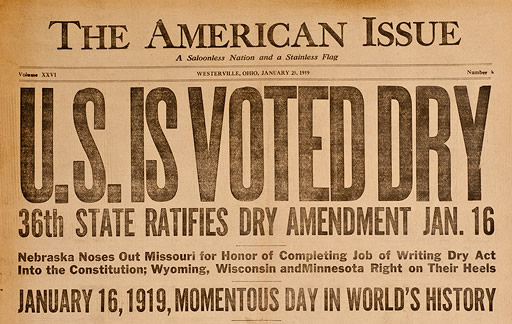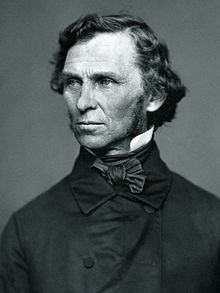A lot has changed over the past 100 years. One thing that hasn’t is Bisson’s commitment to quality professional moving services at a fair price.
On this date in 1919, Nebraska became the 36th state to approve the proposed 18th Amendment to the United States Constitution resulting in ratification of the “Dry Act” and ushering in the Prohibition era. The Act banned the “manufacture, transportation and sale of intoxicating liquors.” However, it did not ban consumption and was thus extremely difficult to enforce. Prohibition was a response to the widespread temperance movement that had swept the country. It was believed that passage of the Act would improve the moral fiber and general well-being of the population, strengthen families, reduce crime, reduce workplace injuries, increase worker productivity, and boost the economy. The result, however, was exactly the opposite as thousands of breweries, restaurants and saloons were forced to close, illegal bootlegging, speakeasies and racketeering flourished (Chicago mobster Al Capone is said to have earned $30 million annually from his bootlegging and speakeasy operations) and workers struck for the return of their beloved beer. Because of the high cost of bootleg liquor, working families felt the greatest impact. The Treasury lost tens of millions in excise tax revenue. For these reasons, in 1933, the Nation passed the 21st Amendment to the Constitution which ended “The Noble Experiment.” It was the first time that a Constitutional Amendment had been revoked.
Prominent, outspoken and often flamboyant Maine politician, Neal Dow (1804-1897), had such an enormous influence on the temperance movement that he was nicknamed “The Napoleon of Temperance” and “The Father of Prohibition.” Dow was born in Portland to Quaker parents. From a young age he believed alcohol to be the cause of many of society’s problems and sought to ban it through legislation. In 1850, Dow was elected President of the Maine Temperance Union and the next year was elected Mayor of Portland (Dow and Neal streets in Portland’s West End are named for him). Soon thereafter, largely due to Dow’s efforts, the Maine legislature banned the production and sale of alcohol. Dow served two terms in the Maine House of Representatives and in 1880 was the Prohibition Party’s candidate for United States President. He lost that election handily but dedicated the remainder of his life to writing and speaking on behalf of the Prohibition movement.
Today, alcohol consumption is, of course, legal in the United States. According to data compiled by the World Health Organization, in 2015, Americans consumed 9 liters of alcohol per capita ranking it 24th among 33 nations studied (#1 was the Czech Republic which consumed 14.1 liters per capita and #33 was Turkey which consumed 2.4 liters per capita). The United States has the highest legal drinking age (21) of any country having an age barrier. In 2019, the United States seems on the verge of removing from prohibition another previously banned substance – cannabis.
It’s been an interesting 100 years!
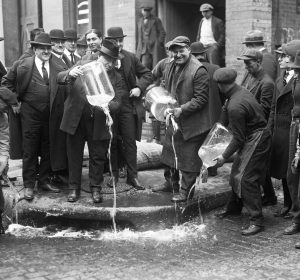
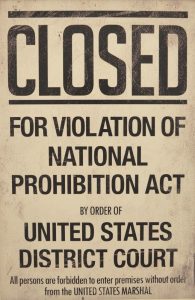
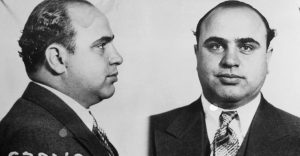
Bisson Moving and Storage Company
Service You and Trust from People who Care
1919-2019 Centennial
www.movebisson.com

